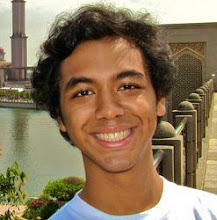While Indonesia is in the middle of a peaceful presidential campaign season, a country in another part of the world is suffering through a post-election turmoil. The Iranian presidential contest between incumbent Ahmadinejad and opposition figure Mousavi ended in huge demonstrations, after allegations that Ahmadinejad’s victory is a result of an unfair, rigged election. Mousavi’s supporters took to the streets, chanting “where is my vote?”. The government denies any wrongdoing, although it has offered partial recounts. Unsurprisingly, Ahmadinejad have accused that “Western powers” are the cause of the unrest.
In the meantime, the government and the Iranian police have conducted violent crackdown against protesters. Photographs of bloodied Iranian beaten by the police, videos of people shot dead, and the news that Facebook and Twitter have been blocked – these saddening reports have made its way through today’s various channels of communication. I need not delve again into this matter since everybody in the world must have known what happened.
What I would like to express in this post is that I support the demands by Iranians for a fair, democratic election and for measures to ensure that the result is not controlled by anyone but the voters. I would also like to express my condolences, support, thoughts and prayers to Iranians; the citizens of the world, especially its leaders, must urge Iran to respect its people’s human rights.
Not to make the wrong start, it is frankly not our right or business to say who should have won the election: it is an internal matter of Iran and its people. We should not be trapped into mocking Ahmadinejad as the demagogue the media made him, nor should we blindly name Mousavi as a messiah whatsoever. Furthermore, I see this human rights tragedy from my point of view as an Indonesian. My country Indonesia have weathered undemocratic regimes and started a Reformasi, during which lives were lost and buildings burned down. Moreover, Indonesians can relate to Iran as both have predominantly-Muslim population.
We must support efforts by Iranians to address all election concerns democratically, the result of which should be accepted by everyone. More importantly, we have urge the current government to stop assaults and censorship against its own people. In its past “deviances”, Iran still proudly claims that it respects human rights; yet those pictures and videos we see in the news tell otherwise. Shortly, world figures must strongly urge Ahmadinejad to make good on his claims. If he refuses, it is not so bizarre to delay the recognition of any new government Iran assembles. Why would we recognize a state that is built on bloodshed?
On Indonesia’s Reformasi, the military also used violence against demonstrators and several students died. There were reports of rapes and of people being locked in buildings and burned alive inside. The following riot wreaked havoc everywhere. However, at the end of the day the regime that has stood for 32 years fell down and the rule of the people comes back to power. So unless Iranian leaders want to be seen as despots, they should stop abusing their power and halt all violence.
As a Muslim, I also have messages to convey. First, Islam around the world has been working hard to prove that Islam respects and supports democracy. Democracy has always been well-accepted by Indonesian Muslims, and it is growing in many other countries which previously adheres to extreme views of Islam. If Iran insists on continuing the oppression, it will hurt the image Muslims everywhere have fought to build and will only engender more slanders against the religion. Second, to Muslims everywhere in the world, we need to make our stance clear that we condemn such violence and human rights abuse committed by the Iranian government. Islam is a religion that protects human rights, although I admit that some people haven’t practiced that part of the teaching yet. Anyhow, we should be the wave of change and show the world that we cannot tolerate this tragic event.
Last, we need to show our support for our brothers and sisters in Iran who are being oppressed. The Muslim solidarity, or the ukhuwah, should not get stuck in Palestine-Israel only. This solidarity must extend its reach to help the people of Iran, too. All people of various faiths worldwide have shown great support, there’s no reason why Muslims should stay silent.
Support Iran’s path to a fair election and to democracy. Stop all human rights abuse.



